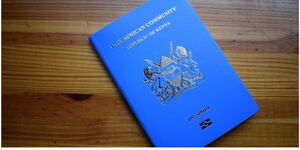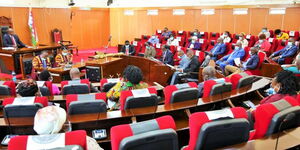The Institute of Certified Public Accountants of Kenya (ICPAK) on Tuesday proposed the government abandon its current strategy of collecting taxes, raising concerns that it primarily affects a small pool of taxpayers.
While making its submissions before the National Assembly's Departmental Committee on Finance and National Planning, the association proposed for the tax bracket to be widened to accommodate more Kenyans.
They pointed out that the taxman only collects taxes from 6.3 million Kenyans while many more are eligible, meaning the tax burden is not shouldered equally.
Further, the association raised concerns over the higher deductions on salaried workers, indicating that it caused a ripple effect on the government's revenue collection.
They argued that higher deductions reduced taxpayers' spending and in turn, decreased the amount the government can collect in the long run from indirect taxes.
ICPAK also called for fiscal consolidation measures to aid in increasing revenue collection by reducing government deficits and debt accumulation. This would be anchored by implementing stronger legal frameworks to prevent tax evasion and avoidance as well as increasing tax audits and modernising tax systems.
The accountants also called for avenues of corruption within the market to be sealed to encourage accountability for every coin spent.
Additionally, they raised concerns regarding the delayed implementation of the National Tax Policy which will set out broad parameters on tax strategies in Kenya. Under the policy, the country will boost investor confidence by anchoring predictability in taxation.
"It is our informed opinion that the development of the Medium-Term Revenue Strategy (MTRS) and the National Tax Policy ought to have assured taxpayers, especially the private sector of predictability," James Muraguri, Institute of Public Finance CEO, told the Committee.
In their presentation, two audit firms also recommended the lowering of the proposed motor vehicle tax from 2.5 per cent to 0.5 per cent of the car's value.
The firms noted that the current proposal would negatively impact vehicle owners struggling with reduced disposable income due to fuel prices.
The Institute for Economic Affairs chair Kwame Owino stated that if the proposed motor vehicle tax passes, it would constitute double taxation because the value of a motor vehicle already incurs an import duty, excise duty and Value Added Tax (VAT).
Owino also noted that the taxes would immensely inflate the cost of vehicles in Kenya.
Further, the Kenya Association of Manufacturers (KAM) urged the Finance Committee to carefully consider the proposed Eco-levy which targets products that are deemed to pose a negative impact on the environment.
These goods include; several telecommunication products, diapers, rubber tires, and packaging materials among others.
The association argued that the tax would cause local manufacturers to be disadvantaged against their regional competitors.
In conclusion, the stakeholders called for the National Treasury to inform the public of the revenue impact of each proposed tax measure to assess its worthiness and institute corrective measures in the required areas.












